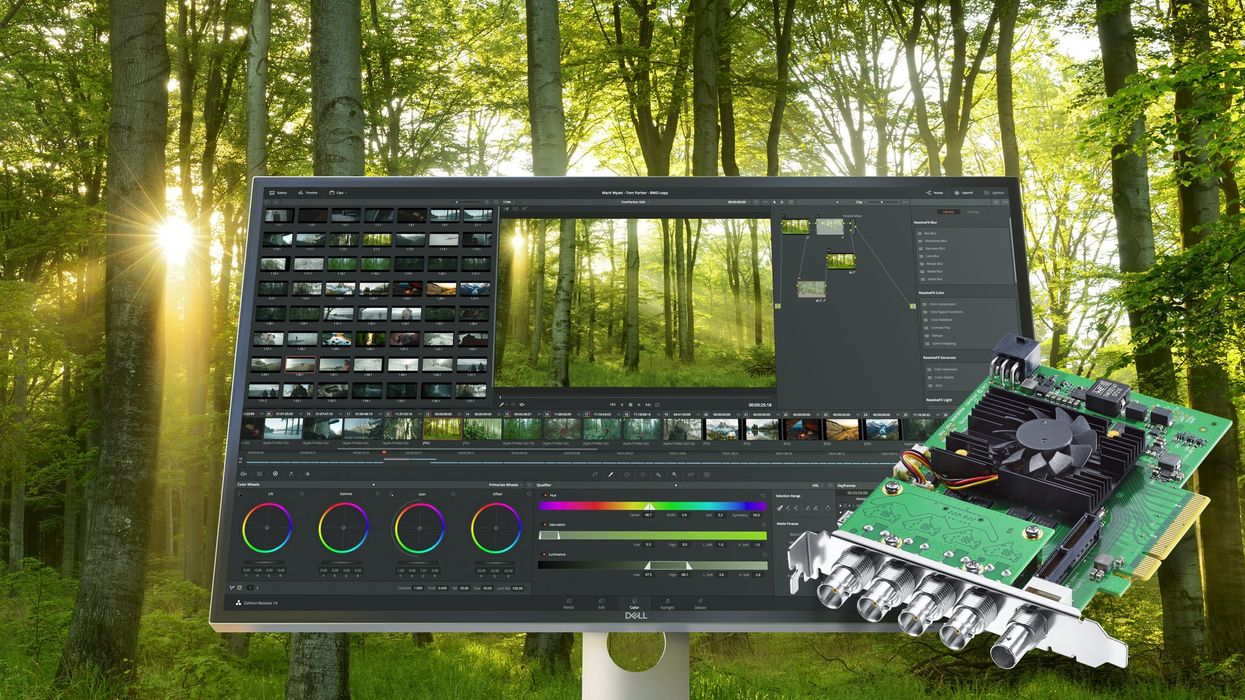Blackmagic 8K Capture and Playback Cards Are Here
Tech Specs (Decklink 8K Pro):

If you want to connect a montior, a camera, or (it's rare but it happens) a deck to a computer, you need some format of capture or interface card to give you inputs and outputs between the world of computer graphics and the universe of broadcast video signals. While we currently still mostly work in 1080p with 4K becoming more prevalent, the push to 8K, also known as Super Ultra HD (SUHD), is on. Now, Blackmagic is in the mix with Decklink 8K Pro, a new capture and playback card that supports full 8K video. Of course, it can't cram all the necessary data for 8K video into a single SDI, so while it does support 12G-SDI, you'll need four of those cables to carry the 8K signal.

These cards are in the PCI-based Decklink line, not the Thunderbolt-connected UltraStudio line. Considering the high bandwidth available in Thunderbolt 3, it's likely we'll see 8K roll out to the freestanding boxes sometime soon, but PCI probably made an easier entry point into 8K for Blackmagic considering the tremendous volume of data that needs to be processed. 8K video is four times the amount of video as 4K, which is itself four times the amount of video as 1080p HD, so we're talking about 16 times the amount of resolution, and data that goes along with it, compared to HD.

Considering the low price point, however, even if we don't move to an entirely 8K universe, many post houses might make the jump to 8K in their next upgrade cycles to future-proof operations as workflows evolve. If even just one of your clients moves some of their production over to 8K, you'll need to support it, and thankfully Blackmagic is rolling out its 8K products with pricing in the ballpark of its 4K offerings.

Blackmagic has also lowered the price for its HDMI to SDI micro converters to $39 for HDMI to SDI, and $45 for SDI to HDMI, which puts them in competition with mass market offerings from companies like Monoprice, but with film set-tested build quality. A key feature of these micro converters is drawing power from USB, so by default, Blackmagic's micro converters come without a power supply (you can add one for another $15, but most of us have a lot of power supplies we never using filling up our drawers).
Since the converters are often rigged in odd places (in the middle of a long cable run or on the back of a TV set), USB power is helpful since most new TVs offer at least one powered USB port that can be rigged to power the micro converter, making cabling simpler. USB power also opens up the ability to use a USB battery pack when you need the converter to be in a truly odd location. If you have a camera that only has HDMI-out and you need to convert it to SDI for a long run, a converter that you can power off a battery (or if you have USB power out from your camera or other battery) will be very useful. The converters support up to 2160p60, so they should be perfect for delivering an SDI signal to a home UHD monitor with only HDMI inputs.

All products today will ship at the top of the new year in January. The Decklink 8K Pro will retail for only $645.
- 12G‑SDI, quad link supports 8K, but single or dual link supports smaller formats
- SD, HD, Ultra HD, 4K, 8K and 8K DCI formats
- 12‑bit RGB 4:4:4
- Rec. 2020 color space support
- Up to 60fps in 8K
- Backwards compatible with 8bit YUV
- Works with Resolve, Final Cut Pro X, Media Composer, Premiere Pro, After Effects, ProTools, and Nuke
- Free SDK











